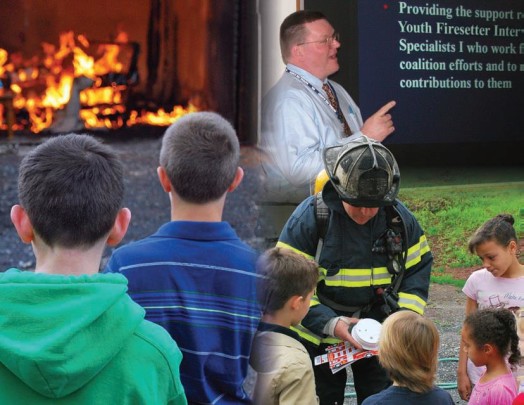During the COVID-19 pandemic and Stay at Home order, fire departments and fire safety experts across Michigan and throughout the country have reported an increase in firesetting and a heightened interest in fire by youth and adolescents.
Nationwide, more than half of all intentionally set fires are started by youths under the age of 18. According to the United States Fire Administration, each year in this country fires set by children and adolescents are responsible for hundreds of fire deaths, thousands of painful burn injuries, and hundreds of millions of dollars in property loss. Young children are also the victims in these fires.
“Fires set by children are common and a problem affecting many families, said Firefighter Michael McLeieer, a leading fire safety expert and President of the non-profit organization E.S.C.A.P.E. Inc. “While curiosity about fire is natural, firesetting is dangerous and deadly. It is not safe to think that youth firesetting is only a phase,” according to McLeieer.
Why Children and Adolescents Set Fires
Most experts agree that the best way to understand why fires are set is to look at the motivations for firesetting. Motives can involve curiosity, experimentation, a cry for help, thrill-seeking, willful intent to cause destruction, or from mental or emotional disorders.
Four Factors Influencing Firesetting
- Easy access to lighters and matches— In many homes where a child or adolescent was involved in starting a fire, they easily discovered the matches or lighter or knew exactly where to find them. If you smoke, always keep your matches or lighter in your pocket or in other secure locations. Inform your child that you will be randomly checking his/her pockets, backpacks, and rooms for matches and lighters.

- Lack of supervision—Providing supervision is important. Parents are often shocked to learn their child was engaged in firesetting over a prolonged period of time.
- Failure to practice fire safety—Young children, teens, and parents often lack understanding of the dangers associated with firesetting and safety rules about fire. Have clear rules rather than relying on vague threats or warnings.
- Easy access to information on Internet—Technology has made explicit media available to youths about many dangerous and often illegal activities for them to replicate.
What To Do If You Suspect A Child Of Setting Fires
If you know of a child who is displaying firesetting behavior, the child and family are at a higher risk for suffering the consequences of fire. Remind the parent that they are not the only person to ever to face this problem. Have the parent or caregiver contact their local fire department immediately. Explain the situation to them. Many fire departments offer youth firesetting prevention and intervention programs. Those departments that don’t offer comprehensive intervention may be able to refer the parent / caregiver to another agency that does offer these services.
Youth Firesetting Program Benefits Include:
- A contact person in your area.
- Determination of potential level of risk for repeat firesetting incidents.
- Fire education for the youth and their family.
- Referrals for additional services.
What Parents and Caregivers Can Do To Reduce Firesetting
- Supervision by adults decreases the opportunity for youth to set fires.
- Teach children of all ages that fires, even small ones, can spread quickly.
- Teach young children that fire is a tool, not a toy, and only used by adults.
- Keep matches and lighters out of sight and out of reach of children.
- Always use fire with care and set a good example by using matches, lighters, and candles carefully.
- Never use threats or scare tactics when talking to the child.
- Teach children to show you when they find matches and lighters.
- Teach older children proper techniques for using fire.
- Point out to your children the fire safety rules you and others follow throughout the day.
- Talk to your children about the legal consequences of firesetting.
- Be sensitive to what the child may be feeling while addressing their firesetting behavior.
- Provide love, comfort and compassion when talking to the child.

What Families Can Do To Prevent Fires
- Regularly inspect your home for fire hazards.
- Install and maintain working smoke alarms throughout your home.’
- Plan and practice home fire escape drills that include two ways out from every room.
- Install residential sprinklers in your home.
What Communities Can Do
- Prevent firesetting in the first place by providing fire safety education from preschool through high school.
- Raise awareness in your community about youth firesetting.
- Form partnerships between local fire departments and private sector organizations to help support firesetting prevention and intervention programs.’
- Support community-based programs to provide services such as fire safety education and counseling using community resources.
- Educate parents/caregivers and all who work with children about where they can go for help about firesetting.
For Further Information:
Contact your local fire department or visit www.usfa.fema.gov or www.escapeinc.org



